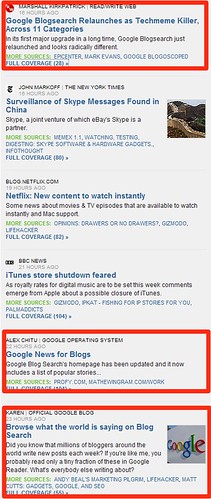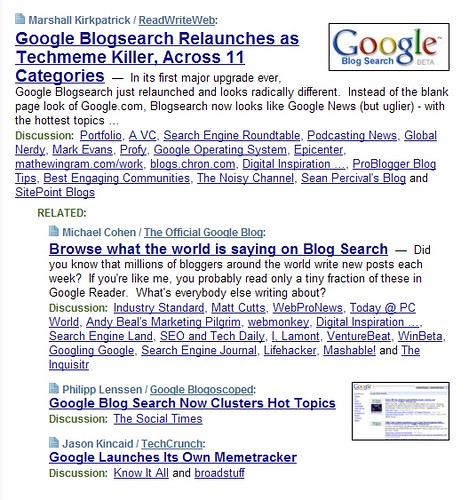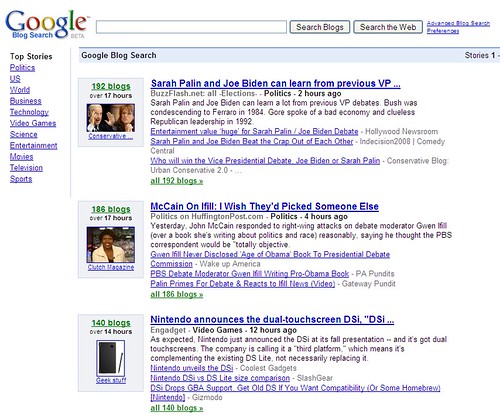Google Blogs & Other “Front Pages” For The Blogosphere
When Techmeme opened in 2005, I’d found a new online newspaper to begin my day with. It quickly and neatly organized top stories as reported by various blogs and news sources for the area I cover. But if you weren’t into technology, you seemed kind of out of luck. Now Google Blog Search has stepped […]
When Techmeme opened in 2005, I’d found a new online newspaper to begin my day with. It quickly and neatly organized top stories as reported by various blogs and news sources for the area I cover. But if you weren’t into technology, you seemed kind of out of luck. Now Google Blog Search has stepped in to bring Techmeme-like organization for all subjects buzzing in the blogosphere. Below, a look at how it compares along with other resources such as Technorati and Blogrunner.
Major Search Engines & Blog Search
Google’s new service has only been out for less than a day, so I don’t want to go overboard with expectations. But blogs have largely been abandoned by the major search engines. Back in late 2004 and early 2005, there were huge expectations that the majors were going to do “something,” plus they dropped plenty of hints that blogs were indeed an area they were going to focus on.
Google finally kicked things off with Google Blog Search in September 2005. Yahoo followed in October, though blog listings were integrated into Yahoo News rather than be a standalone service. At some point, Microsoft allowed for searching of RSS feeds, and more was expected.
Since then, Yahoo’s “temporary” removal of blog search in mid-2006 has continued. Microsoft had feed search through the middle of last year, but it was dropped at some point after that. Google Blog Search continued on, but it remained keyword-based, search driven. That’s fine when you want to seek out news on a particular topic. But what if you want to discover what’s hot, the latest buzz, the latest “meme” that’s out there? That’s where you want memetrackers, as some call them.
I prefer to think of them as places that gives a newspaper-like front page summary of what’s happening. Google Blog Search — or Google Blogs, as you’ll see I think it should now be called — provides a new such front page. But let’s start in understanding it by looking at some of the others out there.
Technorati
Technorati is one such service. It has changed over the years to get away from being a search-driven site to providing a browsable interface. But the service has never taken off with me. I don’t find myself going there on a daily basis. In part, perhaps that’s because it has changed so much so often, I don’t know what to expect (last year, it changed in May, September and December 2007).
Looking at it again today, perhaps I should spend more time at Technorati. It groups many blogs into different categories. I can get a front page for technology or for the 2008 Election, for example. Both show me top “headlines” for those areas, plus headlines overall across the blogosphere are listed on the Technorati home page.
There are several things I dislike. For one, it’s all kind of “blah.” Stories all feel coequal, so I don’t really know what to take in first. There’s also a lot going on. Do I want the “Headlines” tab or the “Rising Posts and Stories” section?
I also don’t like that if you click on a headline item, such as an article about Apple dropping NDAs for iPhone developers, I don’t get to the article itself. Instead, I get a “reactions to story” page showing me what other blogs are saying about the story, plus — if I want — I can do another click to the story itself.
I do like that there’s a mix of blog content and news content. These go together often in the way that opinion pieces and news stories go together in a newspaper, though many blogs have news content as well. I can see On the left, “rising blog posts” and alongside on the right, “rising news stories.”
As I said, I just don’t spend much time at Technorati. I’ve gone back from time to time when there’s been breaking news in my area, to see what various blogs have been saying, and I tend to come away feeling dissatisfied. Maybe that will change going forward. But I also know that Search Engine Land is a top ranked blog in Technorati (currently 79 out of the top 100, and we’ve been as high as the 30s) yet we see hardly any traffic from the service. Given the authority we punch, I’d assume we’re showing up at the site in various ways. To not receive traffic indicates relatively few people are using the service. Certainly back at the end of 2006, we had reports that Google Blog Search had surpassed it in traffic.
Blogrunner
Blogrunner is another service that I’ve tried from time-to-time. Now owned by the New York Times, it operates similar to Techmeme in automatically looking for posts and grouping them by story subject.
Unlike Technorati, I do get impressed by what I find at Blogrunner whenever I head over there. In fact, when I remember to go, I sort of hit myself and think that I should be going there more.
Why don’t I? I suspect that if you’ve read Techmeme, then Blogrunner (at least its technology area, which is where I head) simply repeats the same stories but in a different layout. So it becomes redundant.
Like Technorati, you can use Blogrunner to drill into various categories, such as business or religion or even snowboarding (see the full list here). I like that if you click on a story, you go right to the story itself — not a “reaction” page as with Technorati. But if you want that type of reaction, you can select a “Full Coverage” link such as this and get a collection of related material.
Where Blogrunner has fallen down for me is that it doesn’t seem to consolidate items into a common “story cluster” as well at Technorati. For example, consider how the Technology page currently covers the relaunch of Google Blog Search:
Three different individual stories are listed covering the same topic. Now look at Techmeme:
There’s one topic — Google Blog Search’s relaunch — and all the stories are neatly organized in an easy-to-digest fashion. This is one of the things I love about Techmeme and which keeps me going back.
BuzzTracker
I completely forgot Buzztracker at first until I was doing some further searches for background on this article. So much for the strong support Yahoo’s giving it since buying the service back in September 2007. Like Blogrunner, you get blog posts organized into various categories. In fact, there are lots and lots of categories, such as Jeep news. There’s just no single “all topics” page I could find to point people at.
Overall, the site looks pretty clean and useful. But given you’d hardly know it was associated with Yahoo, I worry that they’ve forgotten they even own it. Still, one to watch.
Techmeme
As I said, Techmeme is where I start my day and where I return throughout it. I have other ways of finding stories in the tech space, but Techmeme remains the fastest and most digestible single source. We’ve covered much about the service, and here are a collection of stories with more information:
And a few from my personal blog:
- Techmeme’s Front Pages: What’s Really A Big Story & How To Go Back In Time
- Techmeme & Fast Look At Other Meme Trackers
Techmeme does have a few Techmeme-like sites for other topics. Gossip hounds, see WeSmirch. Political junkies should Memeorandum. Baseball fans, check out Ballbug.
Google Blog Search
With the redesign, Google Blog Search should get a name change to Google Blogs. That’s because similar to Google News, you no longer have to search to see what’s going on with blogs. You can read from the home page and browse your way into stories.
Looking over the technology area, I was pleased that unlike with Blogrunner, there weren’t multiple story topics or clusters showing up. For the news about Google Blog Search itself, there was one single unit:
One thing I miss, however, is the ability to see what’s especially hot in the way that Techmeme displays things — a big item at the top, other items further down and so on. Of course, that’s pretty much how Google News operates. You get a list of items, one-by-one. But that might also be why I don’t spend that much time at Google News within the individual topical areas.
In contrast, one thing I love about Google News is how on the home page, I get a nice selection of stories from around the newsosphere:
But on Google Blog Search, there’s no selection of top stories divided into subjects. Hopefully, this will change.
Naturally, I want to know why a particular story gets to be the lead item for a topic plus what determines why a particular story topic comes first. For example, I can currently see on the technology page that a story cluster around Apple and iTunes is at the topic, with 57 blogs linking over 17 hours. But further below are topics that are more recent or with more blogs linking around them. Why don’t they come higher? And is it 57 blogs linking to the lead item? Or instead, 57 linking to the subject in general in some way (which seems to be the case).
The help page has some limited information:
Blog Search uses a set of algorithms to try to determine the most popular stories in the blogosphere. We consider factors such as a blog’s title and content, as well as its popularity throughout the rest of the blogging community. (Learn more about Google’s search technology.) Then we display groups of posts that are closely related. Because the process is entirely automated, we’re unable to make manual adjustments to the homepage.
One thing that concerns me about “content” being used is that blog search still does not, to my knowledge, spider pages. It only takes what you feed it. So if you feed it full-text, it has more content. Woohoo! Except that some people don’t put out full-text because of copyright concerns (like us here at Search Engine Land). Too many people interpret a full-text feed as permission to reprint your material without permission.
I raised this with Google way back when Google Blog Search launched and was told it was something they’d look at. I’ll check back with them again on it, plus about some of the other issues I’ve raised about how Blog Search operates, such as what determines which category a story goes into. Ideally, I want publishers to be able to submit a hidden full-text feed only to Google Blog Search, if they want.
Digg? Yahoo Buzz? Others?
What about other places out there, such as Digg or Yahoo Buzz? I haven’t mentioned them because though they’re good resources for buzz, that’s buzz as generated by readers rather than writers. I’m not saying one is better than the other — just different. If you want a sense of what everyone is writing about, Digg and Yahoo Buzz aren’t the places to go. If you want to know what people are talking about, they might better fit that bill.
In other resources, I hadn’t seen Blogs.com before. I spotted it through Marshall Kirkpatrick’s write-up on Google Blog search. At quick glance, it looks interesting.
Wither Techmeme
There’s a lot of chatter about whether Google Blogs is a Techmeme-killer. I doubt it. That’s like saying you’ve been reading People Magazine but now there’s this new thing called the New York Times that’s going to wipe out People. People is a specialty publication. The New York Times covers a broad range of topics. If you’re into celebrities, you’ll almost certainly stick with People.
Right now for many in the tech industry, Techmeme is our specialty magazine of choice, our Wired or Wall Street Journal or Financial Times. We’re going to keep reading it. But there are many people in other industries who need their own Techmemes for different topics.
I just saw a friend from my newspaper days who has to track political issues, including what’s on blogs. She turns to Slate for a rundown on what’s in the various papers plus blog recaps. I pointed out Memeorandum, as an additional resource, but what if she’d been interested in another area. Where would I point her for those topics?
I’ve talked to Gabe Rivera of Techmeme several times over the years about whether he’ll expand Techmeme into new areas. “Maybe” has been the general response. He’s a one-person show, happy with what he’s doing and with no particular ambition to take on everything. That’s been my impression, and I think he’ll continue to thrive.
Meanwhile, Google certainly provides a new option — plus Blogrunner deserves more attention, BuzzTracker is worth a look and Technorati remains out there.
Finally, a personal plea: can’t someone start a marketing news front page? Marketing is not tech, but tech areas often have the burden of carrying this because so much online marketing is mistakenly seen as a tech issue. At least I have our Sphinn site to see buzz in terms of what people are talking about in the online marketing world.
Contributing authors are invited to create content for Search Engine Land and are chosen for their expertise and contribution to the search community. Our contributors work under the oversight of the editorial staff and contributions are checked for quality and relevance to our readers. The opinions they express are their own.
Related stories





